The Joy of Community – See Us Outside, Episode 3
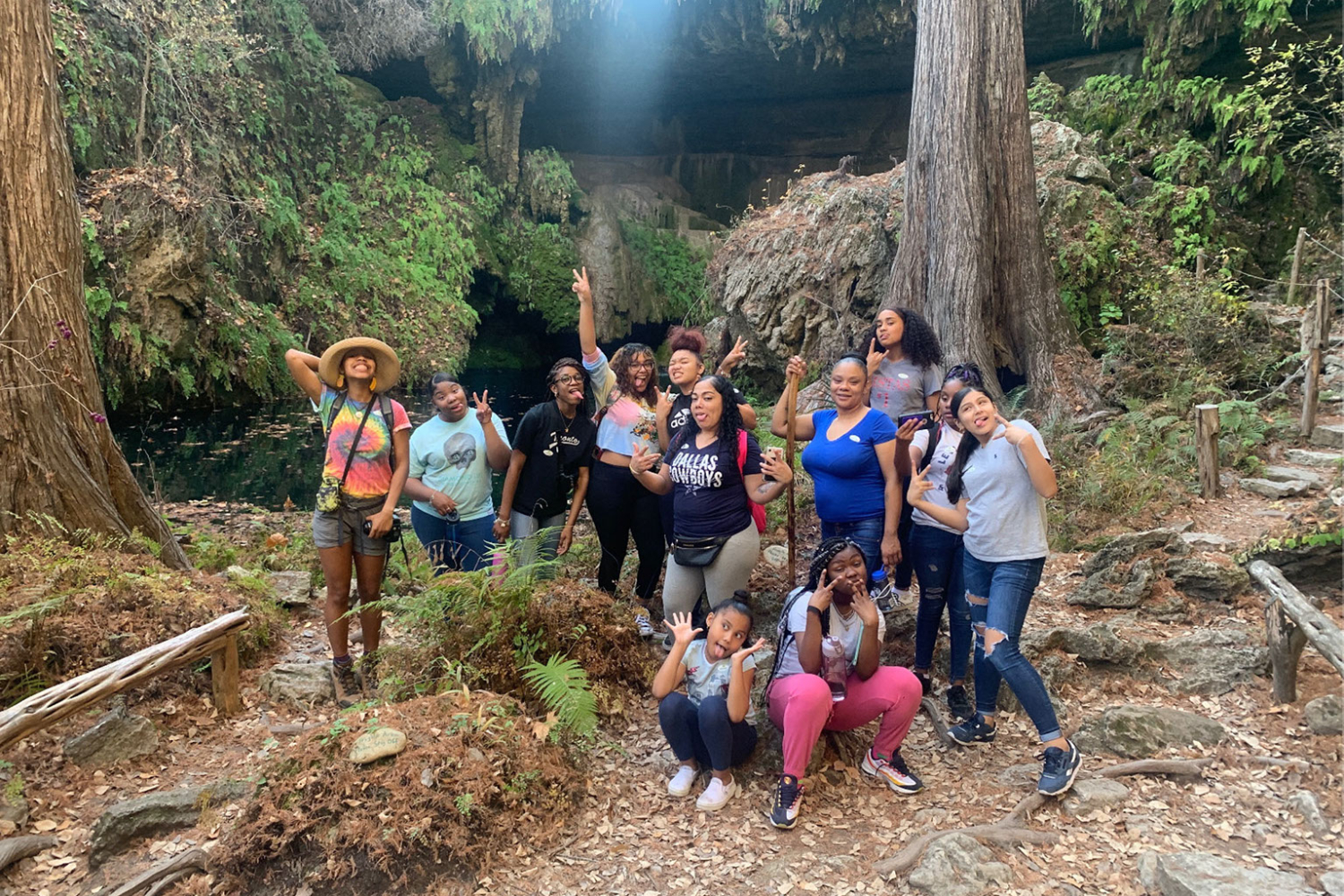
See Us Outside: Episode 3
The Joy of Community
In a shared space amongst Women of Color, there is a unique comfort and freedom, with no need to explain yourself or hold yourself back. The four organizations highlighted on this series are in many ways a testament of the importance of affinity spaces. Their communities, beyond creating opportunities for personal development, leadership, and outdoor skills, reveal the existence of a very special kind of joy. In episode three of See Us Outside, Gabaccia contemplates the power of nature and community in cultivating joy in the outdoors.
Transcript available below the photos and credits!
Banner image courtesy of the Charles Roundtree Bloom Project
Find the episode below, on Apple Podcasts, Spotify, Stitcher, or wherever you stream podcasts.
Featured in this episode: Karina Zavala, Alexis Krauss, Marian Perez, Adriana Guerrero, and Cristal Cisneros; Voice memo included in this episode was submitted by Denise Meeker.
Hosted by Gabaccia Moreno
A Production of Ravel Media; Produced by Gabaccia Moreno, Noël Russell, and Gale Straub.
Music by Joy Ike & Sita via MusicBed
About the series:
This special She Explores miniseries is made in collaboration with The Cairn Project, and made possible by a grant from the Walton Family Foundation.
Host Gabaccia Moreno is our guide in exploring the unique relationships girls and young women of color have with the natural world and outdoor recreation. Through the voices and stories of leaders and participants from diverse outdoor organizations doing the work to help young people of color thrive in the outdoors, this four-part audio miniseries will highlight the joy, connection, and community these girls find in nature, as well as the importance of organizations doing the work to expand outdoor opportunities.
We want to stress that when we say this series highlights women and girls of color, this is inclusive of all cis and trans women and girls, as well as folks of all gender identities who feel comfortable in spaces that center women. That said, for the most part, when we talk about gender we most often do so in terms of those who are socialized as girls and women in a more heteronormative, binary way.
Resources
- Organizations Highlighted
- Featured in this episode:
- Cristal Cisneros
- Karina Zavala
- Alexis Krauss
- Marian Perez
- Adriana Guerrero
- Voice Memos Featured
- Host: Gabaccia Moreno
All Four Episodes of See Us Outside Are Available Now Wherever You Listen to She Explores
The opening See Us Outside Compilation includes the voices of Marinel De Jesus, Yakuta Poonawalla, Meggy Pyaneeandee, Fernanda Jardim, Arlene, Chi Pham, Denise Meeker and Doreen Wong and includes Spanish, French, Portuguese, Tagalog, Hindi, Vietnamese, Cantonese, and English.
Featured in this episode:
Adriana Guerrero, Assistant Director Brown Girl Surf
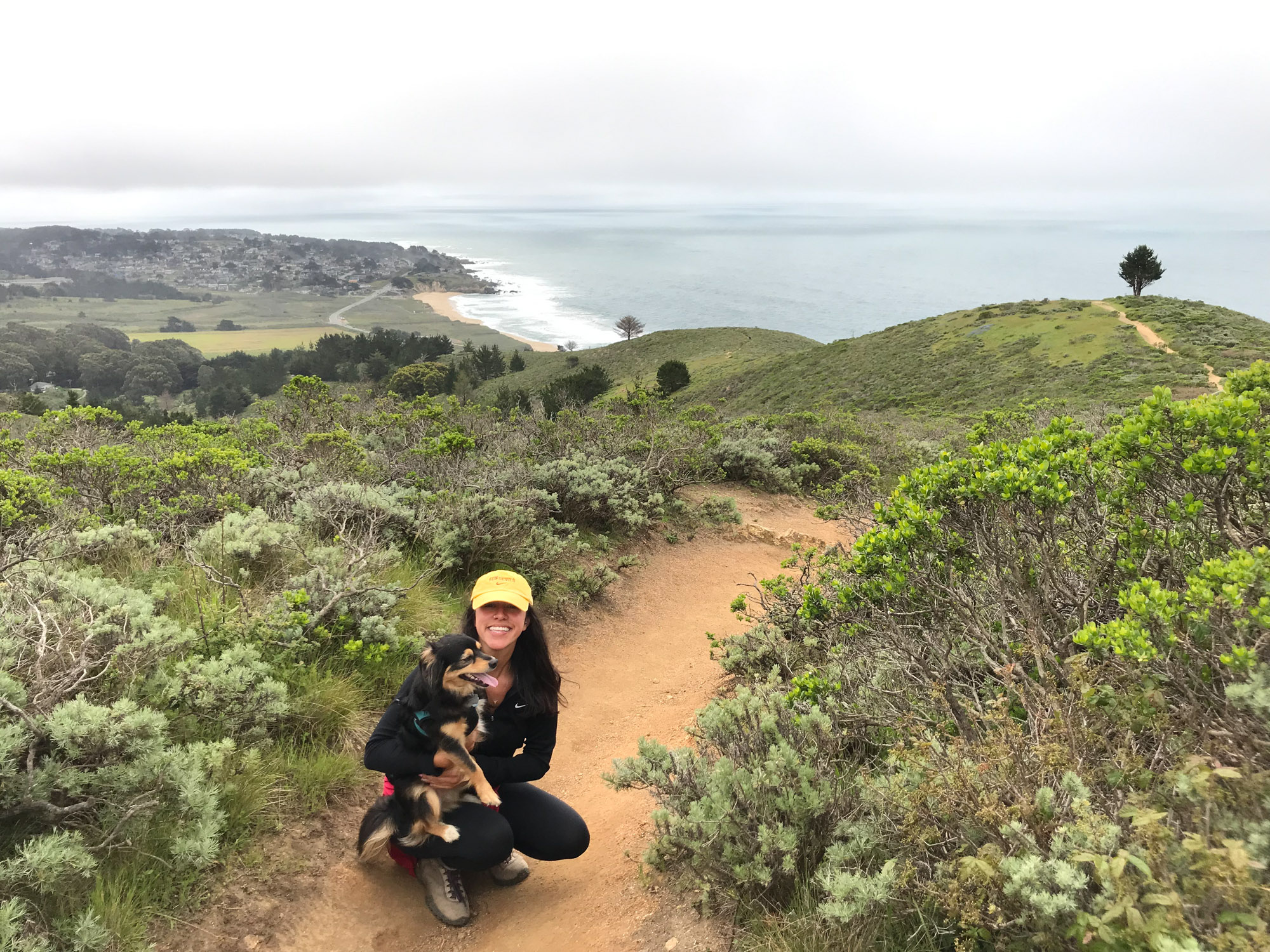
Alexis Krauss, Co-Founder of Young Women Who Crush
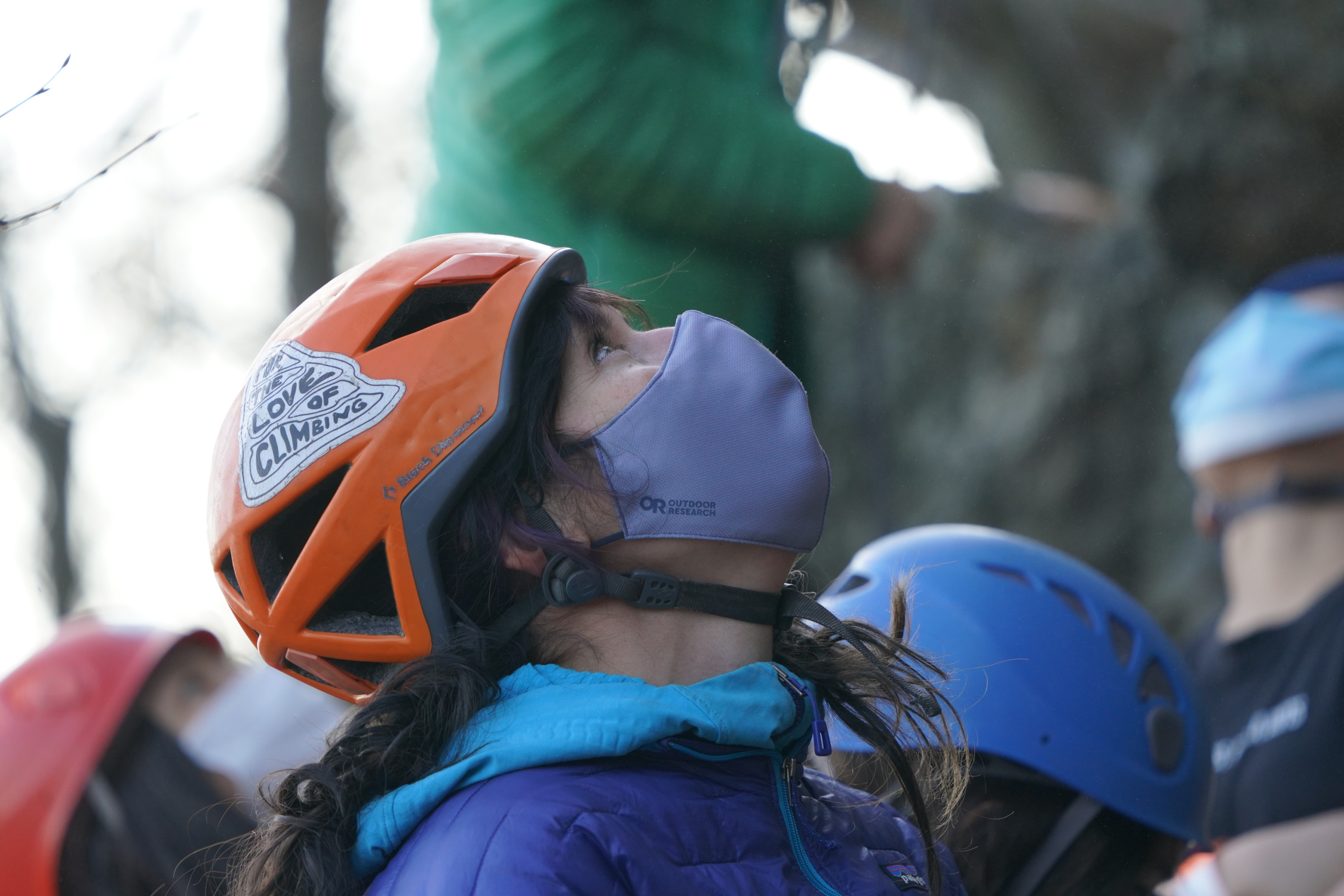
Cristal Cisneros, Instructor in the Trailblazer’s program at Women’s Wilderness
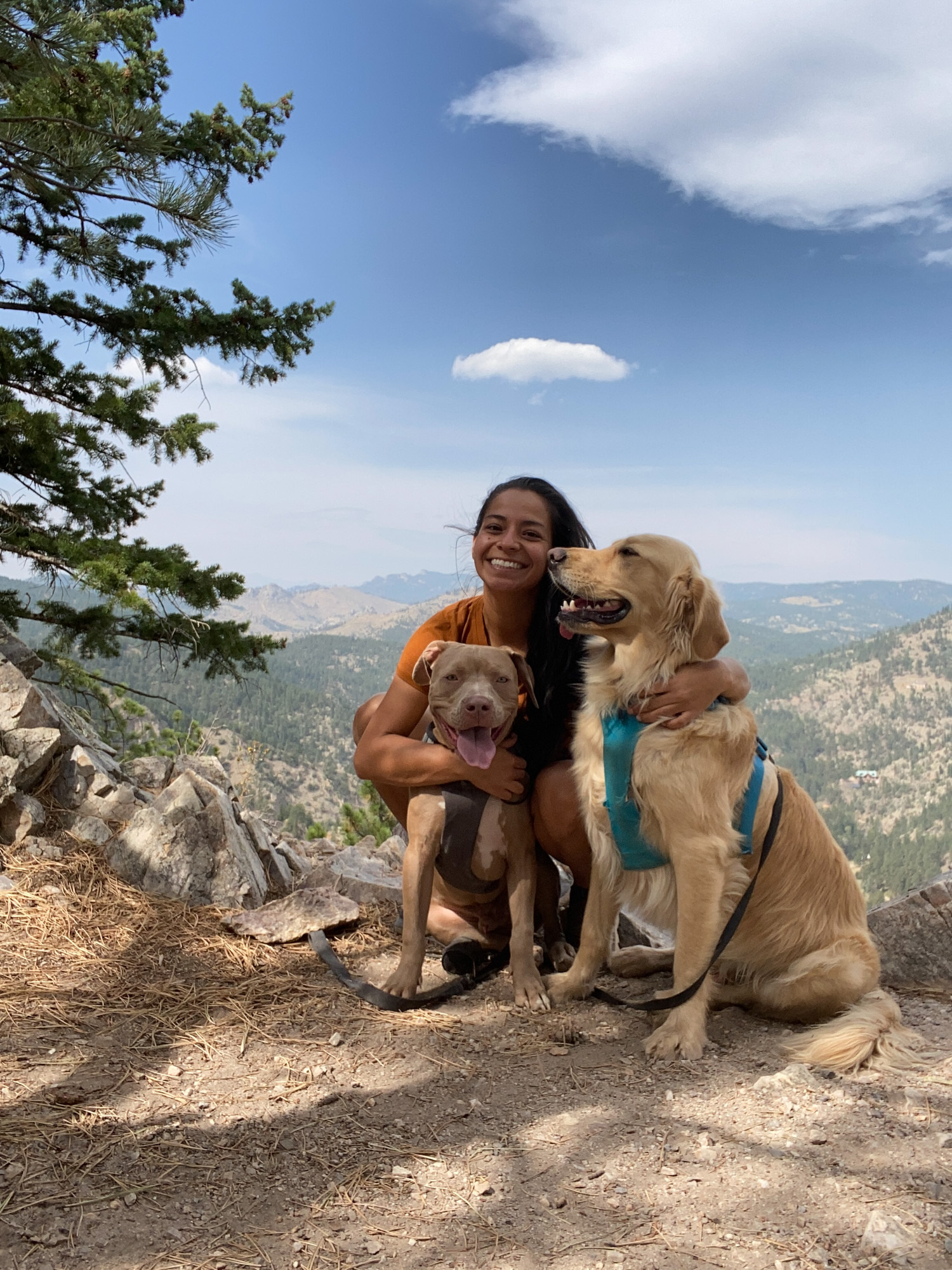
Karina Zavala
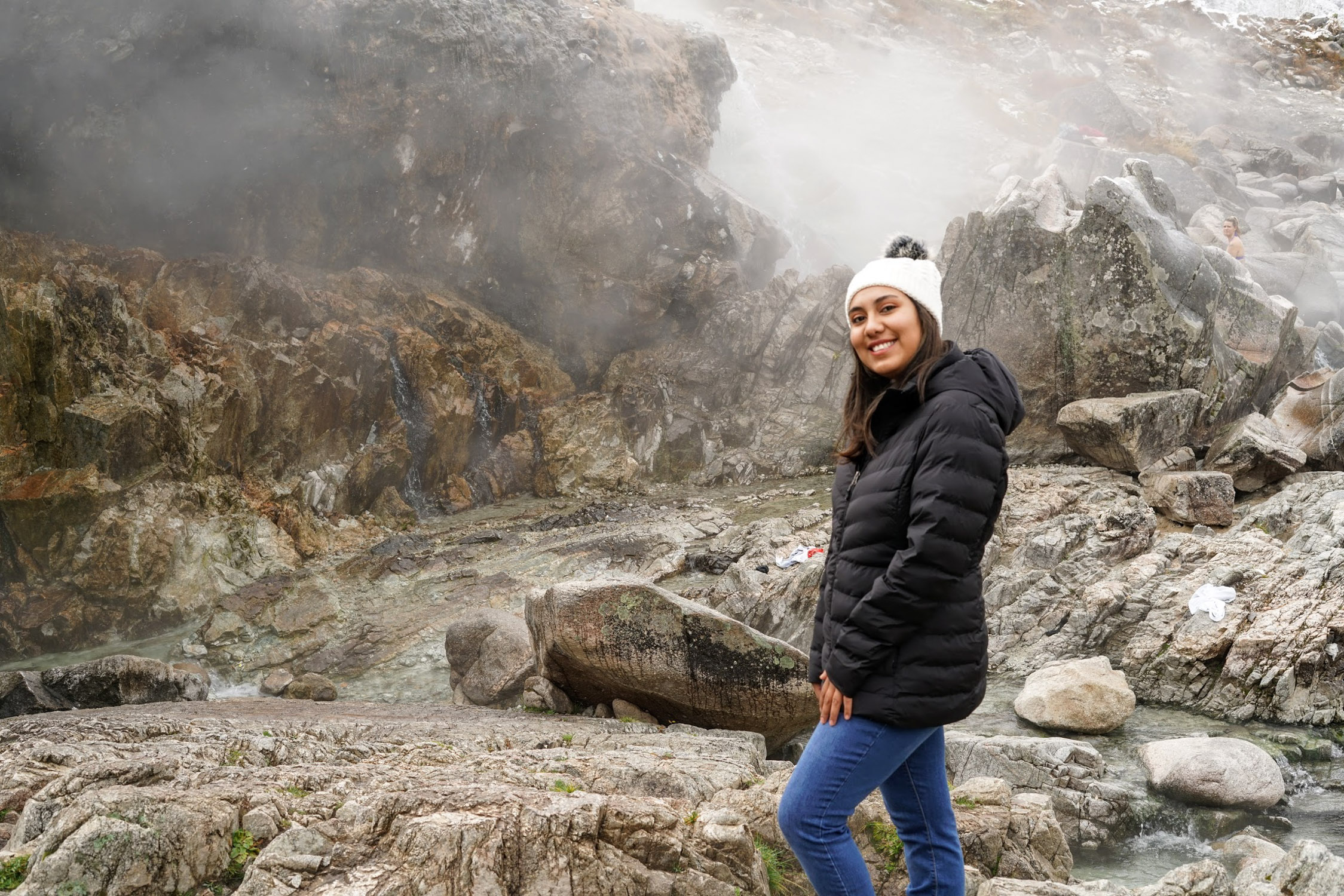
Karina Zavala
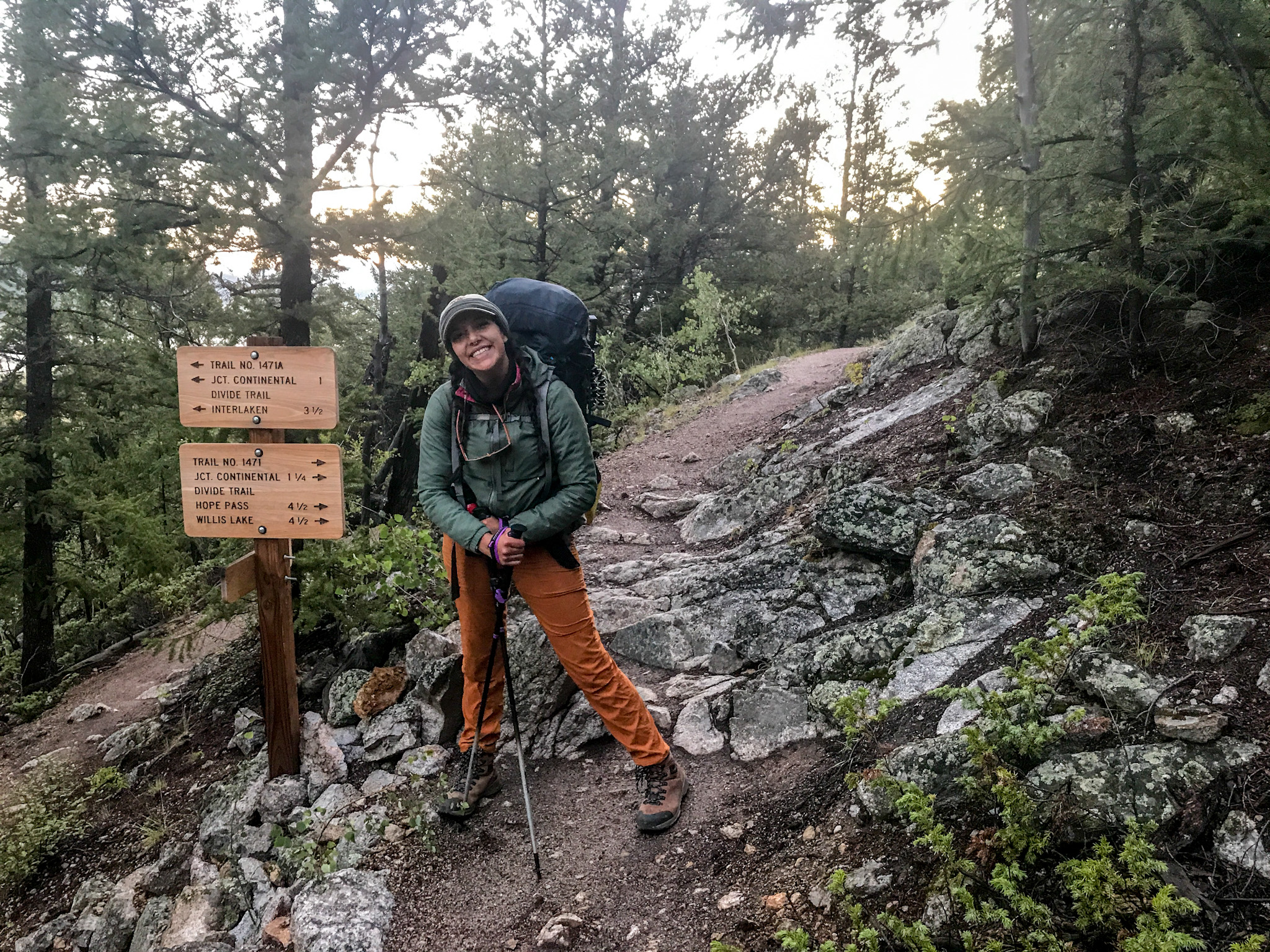
Backpacking in Colorado – Photo by Roberto Flores
TRANSCRIPT
Note: This transcript was lightly edited and created using a transcription service. As such it may contain spelling errors.
Denise Meeker:
When I was growing up, I wish someone had told me that I wasn’t alone. And then I belong in the outdoors as much as anyone else that my love for hiking, biking, skiing, climbing as a black little girl, wasn’t uncommon or abnormal. I wish that I was told to never stop seeking outdoor spaces because one day I would find a community of strong, powerful, brilliant people of countless backgrounds, identities, and experiences who empower each other and love the outdoors. Just as much as I do believe me, when I say it’s out there, you are not alone. You belong in the outdoors as much as anyone else.
SEE US OUTSIDE INTRO
Gabaccia Moreno – Narration:
See Us Outside is a special four-part She Explores mini-series made in collaboration with The Cairn Project with support from the Walton Family Foundation. I’m Gabaccia Moreno, your guide in exploring the unique relationships girls and young women of color have with the outdoors, including the forces outside of our control that sometimes keep us from pursuing time in nature, and the work of four diverse organizations creating access for us to spend more time outside. This is episode 3, Joy in Community.
Gabaccia Moreno – Narration:
There’s something about the embodiment of a brown body that can only be understood by those who share this lived experience. And in the shared space amongst Women of Color, we can find a unique comfort and freedom, knowing we don’t need to explain ourselves, or we don’t need to hold ourselves back. Because for a change, we are understood. The four organizations highlighted on this series are in many ways a testament of the importance of affinity spaces. Their communities, beyond creating opportunities for personal development, leadership, and outdoor skills, reveal the existence of a very special kind of joy.
Cristal Cisneros:
Yeah. So my name’s Cristal Cisneros and I am a Trailblazers Instructor.
Gabaccia Moreno – Narration:
Cristal is a participant turned instructor in Women’s Wilderness Trailblazers program, an outdoor program led by and for women of color. She initially participated in the program because she wanted to find independence after a breakup. Previously, a lot of her outdoor experiences were in the company of her ex boyfriend, a white man. I was curious about whether she’s noticed any fundamental differences of going outside in the company of a white man vs. going out on her own or with other women of color.
Cristal Cisneros:
Oh yes. A hundred billion percent. The biggest thing I think is just, you know, being with a white man, it was okay, let’s go anywhere and we’ll camp and all of that stuff without really taking into account. He never took into account like the very real anxieties that I had when it came to going more in rural Colorado. So I’m sure with everywhere across the United States, those a lot of rural communities are very heavily like Trump supporters. There’s still a lot of like racist that lived there. And so when we would go to these outdoor adventures, especially in the mountains here in Colorado, you know, when we’re driving and I see 10 Trump signs, that fear was definitely there that, and it wasn’t respected and it wasn’t understood.
Cristal Cisneros:
So compared to going with these women of color who were very, very cognizant about is the area that we are taking the group safe. Is it somewhere where women of color can take up space? Is it a place where I feel comfortable being alone as a woman of color? So just keeping those in mind, you know, there’s a big push to diversify outdoors, but people don’t understand that you have to make sure that those outdoor spaces are safe. I mean, we saw the, a black couple who went camping and how to bring it to them. So yes, we definitely want to diversify outdoors, but we have to make sure that the spaces that we are encouraging folks of color to occupy are safe. And that’s probably the biggest difference that I noticed is that with people of color, there were those hesitations and there was that piece of, you know, making sure that it was safe for us compared to being with a white male.
Cristal Cisneros:
It was just like, no, we’re going to go wherever.
Gabaccia Moreno:
And did you feel safe going wherever because you were in the company of a white man or how was that internal feeling?
Cristal Cisneros:
Yes and no, I don’t know how to explain it. I mean, I think yes, having someone that could say, if we were in an area that was not welcoming of people of color, you know, he can pop his head out and be like, we’re good, but at the same time, like that’s not a place emotionally and that I want to be in knowing that I needed someone to feel safe. So yeah, that’s kind of a yes and no question at times I did feel safe at other times. It was just like, you’re not understanding what either microaggressions or racist incidents like what the toll it has on me personally. And so you are taking me into a space that could affect my mental health and make me associate outdoor adventures with this real negative impact on emotional health.
Gabaccia Moreno – Narration:
I would like to acknowledge here, that identity politics play many roles when it comes to feeling safe, welcome, or comfortable in different spaces. Being in white proximity has a different effect on different folks, and while for some, like for Cristal in this example, she had the sense that she could be “ok” — that doesn’t necessarily remove the discomfort of accessing a predominantly white space. Also, our lived experiences will inform how safe, comfortable or welcome we might feel in the company of others who look or don’t look like us, in the company of a man vs a woman, a white man vs a white woman. The topic is layered and complex. Let’s turn back to my conversation with Cristal and hear about the difference it has made for her to get outside with other Women of Color.
Gabaccia Moreno:
So you went through the trailblazers program and then came back as a field instructor. What has that experience been like?
Cristal Cisneros:
Amazing. I think being able to see how much power and joy it brought to myself and being able to create a space that hopefully contributed to power and joy for other women of color was so meaningful and so impactful. I think, you know, when, when you know, something is life-changing, you want to be a part of that. And I think that’s really why I wanted to be a part of the trailblazers program as an instructor because, you know, it was life changing for me. And I just loved that program so much that I’m like, I don’t want to redo it, come back and share what I learned as an instructor. And then there’s also that it’s nice coming from being the instructor and then going to the instructor, because you can kind of understand some of either the concerns or the joys that the participants had because you were in their situation.
Cristal Cisneros:
Right. So it’s kind of a, a great balance of just having, being able to understand both sides of the coin and the nitty building and the support and the uplifting of one another. I think that has been the biggest thing that I’ve seen. Um, you know, when you start with a cohort you’re somewhat shy and reserved at first, and then seeing the progression of this like strong bad-ass community of women, girls of color, who are like cheering for one another, who are, it’s just this amazing community that has each other’s backs. And I think that has been the biggest reward is the overnight backpacking trip. And, you know, participants expressing, I don’t know if I can do it. And then everyone rallying around being like, yes, we can, we can do it. Like, let’s go, you know, I can carry this for you. I can carry this for you. Like, we can take a break right here, but let’s keep going. So just having that community of support, I think, and watching it grow,
Gabaccia Moreno:
Why do you think it’s important to create spaces for learning and building bonds in and around the ocean that include girls of color?
Adriana Guerrero:
Yeah. I mean, I’m a water sign, so of course I’m biased, right? Like my connection to outdoor spaces or any form of water, like that’s, that’s just innate in me.
Gabaccia Moreno – Narration:
This is Adriana Guerrero, the assistant director of Brown Girl Surf, an organization that’s building a more diverse environmentally reverent and joyful women’s surf culture.
Adriana Guerrero:
I think it, I think it really goes back to also like, again, why Brown girl surface founded was the idea around representation, right? Like for Hannah and Mira, I saw that there was a lack of representation and how that can influence and you participating or just choosing, choosing to participate too. Right? Like that’s, I think the beauty about our programs is you try it and if you don’t like it, that’s cool. If you try it and you love it. That’s cool too. Right. I think that’s the freedom and the privilege for especially young girls is to kind of opt in and, and to, to choose to be advocates for themselves. Right. And, and empowering them in that way and say, Hey, I’m going to try this. And it’s okay if I don’t like it, at least I tried. Right. It’s that idea of saying that I belong here and I have a right to, to just check this out, to try it and, and to pursue it if I don’t.
Adriana Guerrero:
And so it’s something that I’ve seen too in our programming is this like not only individual competence, but this group competence, right? Like, that’s awesome. I think the joy of Brown girl surf in our programming is we, we literally due to COVID, we literally take up space because everything has to be socially distanced on the beach. And I was reflecting on their program manager. Like it’s such a statement and there’s such a beauty in that. Like, we occupy so much of the beach when you see us. And it’s like, Hey, we’re here and we belong here. And so that’s the messaging that we also instill with our presenters within our programming is, is you belong here. You will, you have the right to take up space on the beach and you have the right to connect with the ocean and all she has to offer.
Adriana Guerrero:
Right. Especially right now, you know, through the healing power of the ocean as well. And I, I think that that’s really critical for girls, especially girls of color, because we don’t always see ourselves in those spaces or think that we are entitled. Right. Cause there’s, there’s a lot of that that comes with privilege for some folks in the outdoor space, is that level of entitlement and understanding that nature is for everyone, right? Like she has, she belongs to no one and the same with mother earth. Right? Exactly. Yeah. I was actually reading something today about it was related to permaculture, but it was basically like criticizing how permaculture erases the indigenous origins of living in balance with nature. And one of the things that they were saying was, you know, in most indigenous languages, they don’t even have a word for nature because we are part of nature and we are one with her. So it’s not this thing that I think in, in our settler colonial mindset, we think of nature or land as this thing that’s, that can be divided and allocated to specific individuals wearing reality is we are just here with it and part of it. Yeah, I agree. What’s powerful for girls and young women about receiving mentorship from other women that look like themselves. And this is specific for girls of color.
Adriana Guerrero:
I think the power of representation is, is even to me, like at my age, I think the conversation in our, in our country and society, for some people, it’s a real awakening, it’s awakening, it’s a reckoning, right. And just understanding the harm that the lack of representation has had for young girls and women of color and this idea of how they need to participate in our society or should be seen and not heard. And this is what is expected from them versus that. And so to be able to be in the spaces that our community shares together, right, it’s we all share this connection of, of the love for ocean and for some of us for surfing and some of us it’s the growing love of surfing. Right. And then to be able to have those conversations and you hear that you can’t really tell because everyone’s wearing a wetsuit, right.
Adriana Guerrero:
And so we all look the same in like a black wet suits with our rash guards and you don’t know how old someone is or what someone does maybe in their professional career, or maybe what they’re studying. And so what I have seen and heard a lot and how it’s been impactful and beneficial, especially for our younger girls to have someone who is older and to be able to have those like real, real conversations, then you remove the power dynamic and that authority that sometimes can happen in a young person, adult conversation. And they’re just having a real candid conversation about what is it like to be a woman of color, like, you know, and the pressures that come with that. So it’s, I wouldn’t even say it’s that like adult to peer, because I think I learned so much from the young people every time Marlene, my program manager and I have, we like, we do a program debrief and I’m like, wow, like I learned so much from so-and-so, you know, and that’s the beauty of working with young people.
Adriana Guerrero:
You know, I say they keep us young at heart, but there’s just so much knowledge and wisdom to that young people have to offer us. And so it’s just almost like cross mentorship that I see happening. And so just knowing that, you know, these young girls that are, you know, whether they’re just starting high school or starting college, you know, they know they have an additional support system to come back to if they have a question or they want to do it interview mock interview and things like that, you know, they, we are there an additional community for them. We’re always here with open arms for them. And so I’ve seen that be really impactful and powerful.
Gabaccia Moreno – Narration:
This idea of communal cross mentorship. The fact that instructors learn from participants just as much as participants learned from mentors. It’s something that came up again and again, in my conversations in these spaces, there’s a feeling that everyone’s voice is valued. Here’s Alexis Krauss, co-founder of young women who crush a program that teaches climbing to New York city youth.
Alexis Krauss:
The thing that comes back most often is just the power of mentorship and relationships and community. Our crushers are very close to one another. Um, they’re very close to their mentors and there’s just this beautiful reciprocity that exists and the way that mentorship evolves and the way that one year the participants will be brand new. And then they’ll the next year they’ll be mentoring their peers and then it just grows and grows and builds from there. So I think the power of community and the realization that that community is there for them is probably one of the things that our, our crushers talk about most. And then there’s also just the joy that it brings them. There’s a lot of happiness. There’s a lot of spontaneous laughter.
Gabaccia Moreno – Narration:
Part of the mission of Young Women Who Crush is creating a safer space for dialogue around gender, race, sexuality and other aspects of identity. Alexis shared that they help facilitate this environment by starting every session with an indigenous-inspired gratitude practice and an additional quick mental health check-in to help everyone get in the best headspace to climb.
Alexis Krauss:
You know, this is a space for women and gender expansive youth. And this is a space where like, pronouns are super important. Uh, one of our mentors, Lou has been incredibly, incredibly influential in how we introduce ourselves and, and they always reminds us the power of pronouns and the power of identity. And because our space is gendered in that it’s a women’s space. How can we make that space as inclusive as possible? So we have done workshops with them all about their photography and what it means to be non-binary. And so we have actual conversations about gender. We have conversations about sexuality and how we can support each other. And for our students who are really going through and in high school and trying to contend with their own identity and what it means to be, you know, a young gay woman from an immigrant family that has very traditional values in a lot of ways.
Alexis Krauss:
So we talk about religion. Um, we talk about what it means to be a woman in, you know, and, and how to respect family traditions, but how to also, um, seek education. I mean, you know, I have really intense conversations with one of our mentees. Marjana, she’s been in the program now for a while, and she’s a young Muslim woman and she wears a hijab and she’s also the first woman in her family to go to college and to leave home. And so, you know, just having a lot of these conversations. And so it’s like, it feels like it’s, it’s super easy to kind of like approach this stuff from an academic space when you’re not like, I don’t know. It’s like, it’s easy to kind of think about like, how are we going to have these conversations? But if you just put a bunch of young women from all over the world, right?
Alexis Krauss:
Like from the Philippines, from Yemen, from Bangladesh, from the Dominican Republic, like if you just take all of those girls between the ages of like 13 and 22 from all of those experiences, from all of those ethnicities and cultural backgrounds, like they’re so diverse, like all of those bases are essentially going to be covered if you create the space for them to have the dialogue. And that’s what we’re about is just like, how do we allow you to explore what’s already there, right? Cause it’s all there. It’s all represented. It’s just a matter of like, how do we, how do we allow you to just like dig into it and just like really chew on it.
Gabaccia Moreno – Narration:
Alexis emphasizes that Young Women Who Crush isn’t a top down organization, it’s mentee and mentor led. This came through in my conversation with one of their mentors, Marian Perez. We talked about the power of girls and young women seeing their mentors, often women of color, push through fears while climbing. We also talked about how the community cultivated through the organization allows for Marian to show up as herself and speak honestly about her beliefs:
Marian Perez:
In that community with Young Women Who Crush, seeing how, like how much of an impact they leave. Even for me, like, it’s been really hard for the past couple of years with other things that have been going on in my life. But like, I couldn’t freely say things like black lives matter in my previous life that I had because of, you know, relationships that I had because I didn’t want to offend other people.
Marian Perez:
And it was just like no black lives matter. And like being surrounded by people that feel the same way and they’re open and they are not afraid to say that. And even the mentees supporting that. And it’s just like, Oh wow. Like I finally feel like I have a community that understands who I am and my beliefs. And I don’t feel like I have to hold anything back because I have such a supportive team behind me, you know? And it was just, it was nice to hear that. And it was nice to see us all be together in that moment, even though we weren’t. And again, like having that sense of community is so important for people that maybe haven’t had safe spaces to be themselves and to be vulnerable and to support organizations or to support movements that are needed. That’s what young woman who crushed. That’s what they do. Like that’s the empowerment that this organization gives.
Gabaccia Moreno – Narration:
This empowerment, this joy to stand in your beliefs and to show up as your full self comes through in all the organizations I talked with for this series. Affinity spaces are powerful and necessary.
Gabaccia Moreno:
Can you share your name and your role at Charles Roundtree Bloom Project?
Karina Zavala:
Yeah, I’m Karina Zavala, and my role at Charles Roundtree Bloom Project began as a volunteer and I slowly got more involved as the organization grew. And right now my role is a volunteer coordinator and an advocate for youth of color.
Gabaccia Moreno – Narration:
In episode 1, our cultural connection, we heard from Charles Roundtree Bloom Project founder Ki’Amber Thompson about how her organization is helping youth who have incarcerated family members re-connect to the outdoors. Volunteer coordinator Karina helped me understand the healing aspect of being in community with youth of color who have this family history in common:
Gabaccia Moreno:
What motivated you to get involved with the Bloom Project?
Karina Zavala:
So when I first heard of the Bloom Project, I was doing a service year as an AmeriCorps member in San Antonio, Texas and Ki’Amber reached out to the organization city year that I was working for and they sent out an interest form to fill out. And I remember the first thing that caught my attention was the, what we do, which was to provide healing centered outdoor experiences and educating the youth on the environment around them. I was going to be working with, with youth that have had parents that were incarcerated or relatives. And I had relatives that have been incarcerated and know the difficulty of healing. And I was just motivated to get involved and use my knowledge and energy towards this project in any way that I could.
Gabaccia Moreno:
Yeah. That must have been. How, how did you feel when, when you saw that description on it?
Karina Zavala:
Yeah, I thought it was surprising to me cause it was the first time that I had ever heard of any organization working like that. Um, or with you that it was just something different to me. And I was surprised also very happy at the same time that, you know, there was someone that was going to be doing something like this. And I just wanted to be a part of in any way that I could because it’s, you know, it’s hard. Um, speaking from like a personal experience, you know, having relatives that have been incarcerated, it’s difficult to heal. And I think using the outdoors, it’s, it’s a great experience to center that as a healing center, you know,
Gabaccia Moreno – Narration:
Karina found the healing power of the outdoors at a young age living and growing up in Idaho and feels particularly motivated to share it with the youth through the Bloom Project.
Karina Zavala:
Um, ever since I was little, I just remember going outside and playing with my dad. And I think those memories help me every time I go outside it just, I go back to those memories right, as when I was a child and it helps me heal. Right. And it takes me to like a happy place and those memories, I like relive them again. Right. And it helps me heal from the bad things that happened and going camping with my family to, um, creating those experiences with my family have been also a healing part of me.
Gabaccia Moreno – Narration:
Karina shared with me that she’s seen youth enter the program timid and unsure, then grow more comfortable and confident after spending time outside with peers — all the while, the Bloom Project is striving to create a safer space outdoors for their participants. This is made possible through community that understand what it’s like to grow up with family members who have been incarcerated:
Karina Zavala:
It’s easier to, for people to feel comfortable and to feel safe. Um, when you hear someone else’s story that has gone to the same as you, or similar as you, I at least I personally feel more connected, right? I’m like, yes, I feel you, you know, or like I, you have similar feelings and you’re just feel more safe to open up and share your experience as well than with someone you don’t really resonate with. Right. And having this community with similar backgrounds. That’s why, when, when they do join, you know, we ask, have you had any parents or any relatives that have been incarcerated in the past or similar to that. And I think it’s important that the youth feel comfortable with their mentorship. So right now we’re kind of looking for that, right. Someone that has a similar background or able to understand them from that point of view.
Gabaccia Moreno – Narration:
These spaces, created for and with joy, are a powerful force for us Girls and Women of Color. You may have heard the terms Black Joy or Brown Girl Joy – these are not simply referring to happiness or pleasure, joy in this context is an act of resilience. Living as a Woman of Color can be exhausting – we endure systemic disadvantages, negative stereotypes, racial profiling, blunt racism, hate speech, colorism, among other agressions both within and outside of our communities. This could easily cloud our mood, motivations, and outlook on life – yet we show time and again, we are beyond capable of joy. Oprah Winfrey defines joy “as a sustained sense of well-being and peace – a connection to what matters.” After having all the conversations that make up this series, I am better able to understand how nature and community are great enablers of joy – because they matter above all barriers.
Be the first to comment